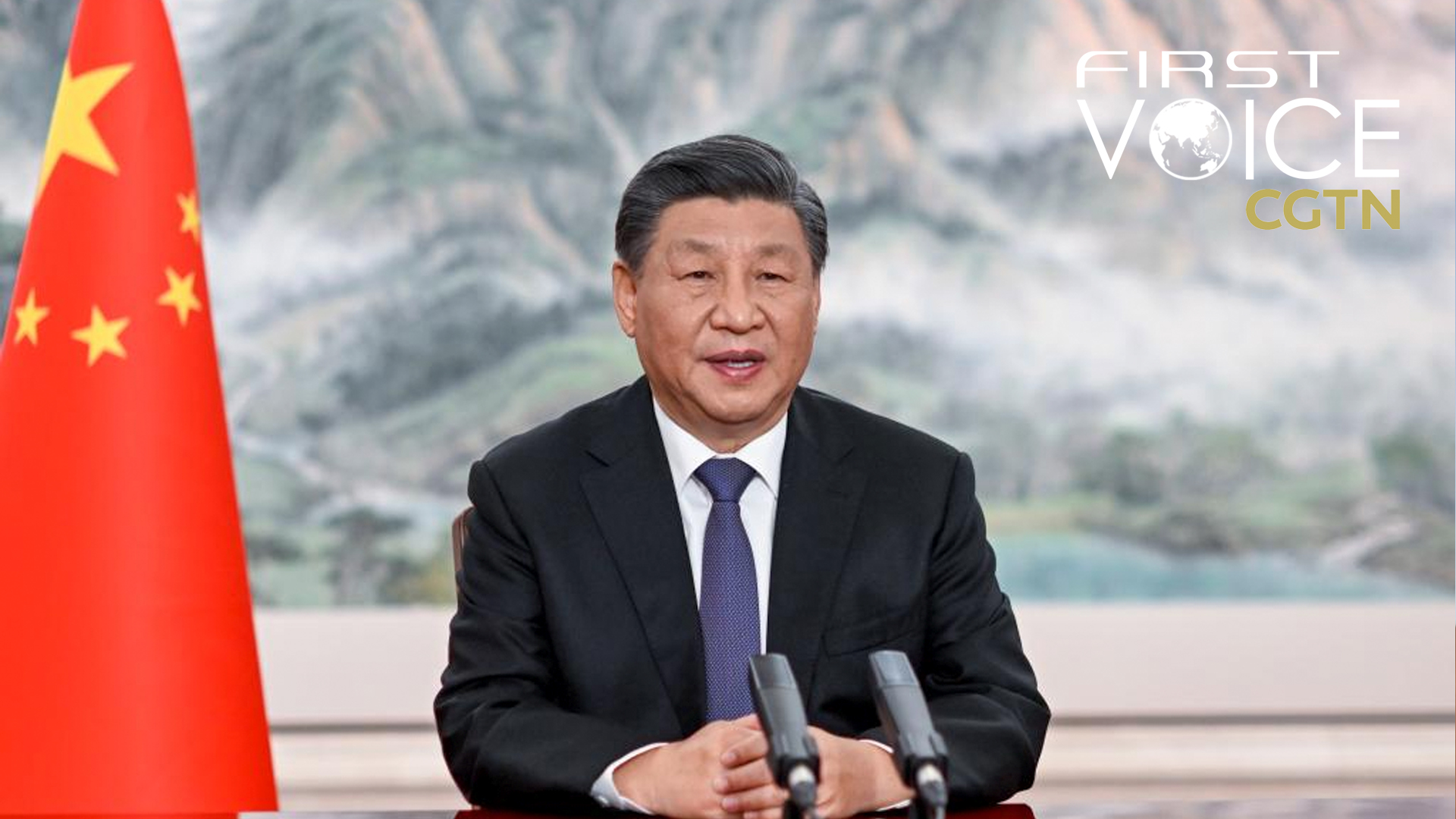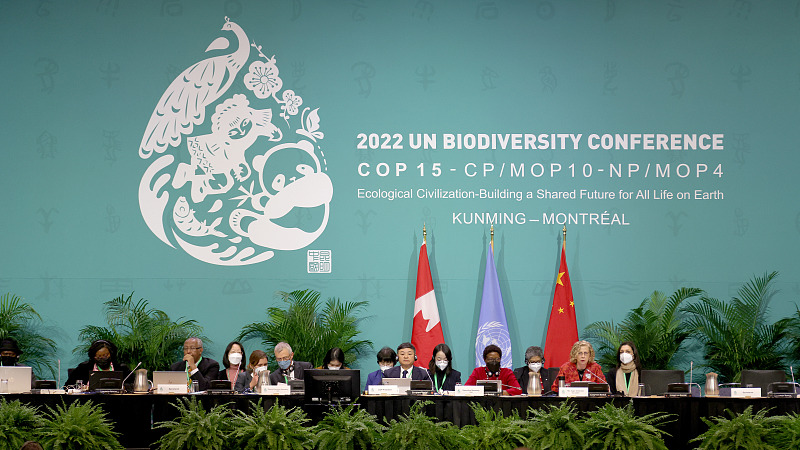
Editor's note: CGTN's First Voice provides instant commentary on breaking stories. The daily column clarifies emerging issues and better defines the news agenda, offering a Chinese perspective on the latest global events.
"A sound ecosystem is essential for the prosperity of civilization," Chinese President Xi Jinping said Thursday as he reiterated China's commitment to elevating global biodiversity governance to a new height. "We must work together to promote harmonious co-existence between man and nature, build a community of all life on the Earth, and create a clean and beautiful world for us all."
Xi made the remarks as part of his address via video link at the opening ceremony of the high-level segment of the second part of the 15th meeting of the Conference of the Parties to the Convention on Biological Diversity (COP15) in Montreal, Canada.
China holds the COP15 presidency. The first part of the UN biodiversity conference was held virtually in Kunming, the capital city of China's Yunnan Province, from October 11 to 15, 2021 that concluded with the adoption of the Kunming Declaration.
Emphasizing that China has promoted ecological progress and biodiversity protection, Xi noted that this has led to an improvement in the diversity, stability and sustainability of the ecosystem over the decades. "We have found a path of biodiversity protection with Chinese characteristics," he said.
The Chinese President promised that going forward, China will continue to advance ecological progress, and plan its development in the context of promoting harmonious co-existence between man and nature. "We will respond to the Action Plan for the UN Decade on Ecosystem Restoration, and launch a large number of key projects on biodiversity protection and restoration. We will deepen international exchanges and cooperation," Xi said.
"We will do our best to provide support and assistance to fellow developing countries through the Belt and Road Initiative International Green Development Coalition and the Kunming Biodiversity Fund, so as to elevate global biodiversity governance to a new height," he added.
The ongoing COP15 is the biggest biodiversity conference in a decade. A total of 167 ministerial representatives from 155 parties and two observer states are attending the COP15 high-level meeting from December 15 to 17. Senior representatives of 71 international organizations and institutions are also in attendance. A total of 18 ministers and 35 heads of international organizations are expected to deliver speeches at the high-level meeting over the next three days.
The UN biodiversity conference has caught worldwide attention as it is expected to agree on a Global Biodiversity Framework for the coming decade, believed to have the potential to be a "Paris moment" for nature and biodiversity. More than 20 targets are included in the draft agreement for the framework, including the fundamental pledge to protect 30 percent of the world's land and seas by 2030, as well as objectives to eliminate harmful fishing and agricultural subsidies, tackle invasive species and reduce pesticides.
The prickly issue of biodiversity financing

China hosts the ongoing high-level segment of the second part of COP15 in Montreal, Canada. /CFP
China hosts the ongoing high-level segment of the second part of COP15 in Montreal, Canada. /CFP
Negotiations at the COP15 started last week and have entered a critical stage with just days left for discussion over the outcome document on reversing global biodiversity loss. Significant differences remain between the parties at COP15, chief among them the issue of how much must the developed nations pay the developing countries to assist them in saving ecosystems, and whether a new, special fund can be established for this purpose.
The Global South, home to most of the world's biological diversity, is demanding a special Global Biodiversity Fund (GBF) to help them meet goals, for example by setting up protected areas. But wealthy countries are reluctant and do not favor the idea. They are proposing instead to make existing financial mechanisms more accessible.
A number of developing nations, including India, Brazil, Indonesia and many African countries are also seeking funding of $100 billion yearly, or one percent of global GDP, until 2030. Current financial flows from high-income countries to lower-income ones are in the order of $10 billion per year.
Disagreements over the prickly issue of biodiversity financing led to a walkout by negotiators from developing nations overnight Tuesday and caused a temporary halt in talks, according to reports. China showed the right leadership and held a crisis meeting of heads of delegations on Wednesday to convince all parties to return to the negotiating table ahead of the start of the high-level segment.
China hopes that the parties could arrive at a consensus for a larger cause. As President Xi said in his address: "Humanity lives in a community with a shared future. Be it in overcoming the COVID-19 pandemic, or in enhancing biodiversity protection and achieving sustainable development globally, solidarity and cooperation is the only effective way to address global challenges."
As the presiding country, China also hopes that all the goals and commitments achieved at this conference will be acceptable to all parties and stand the test of time. The framework should balance ambition and pragmatism, and a resource mobilization system commensurate with the goals of the framework must be established to ensure its effective implementation and mobilize the full participation of a wide range of parties and stakeholders.
The key to the success of the COP15 endeavor could be found in the old Chinese saying that Xi cited in his address: "All living things should flourish without harming each other; all ways of life should thrive without hindering each other."
Through its experience, recent efforts and visionary leadership, China has demonstrated its commitment to open a new chapter "in building a community of all life on the Earth and create a bright future of harmonious co-existence between man and nature." It is now for the rest of the world to act in the interest of a shared future for humanity.
(If you want to contribute and have specific expertise, please contact us at opinions@cgtn.com. Follow @thouse_opinions on Twitter to discover the latest commentaries in the CGTN Opinion Section.)